

Transhumanism. Transhumanism (abbreviated as H+ or h+) is an international cultural and intellectual movement with an eventual goal of fundamentally transforming the human condition by developing and making widely available technologies to greatly enhance human intellectual, physical, and psychological capacities.[1] Transhumanist thinkers study the potential benefits and dangers of emerging technologies that could overcome fundamental human limitations, as well as the ethics of developing and using such technologies.
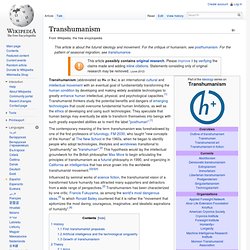
They speculate that human beings may eventually be able to transform themselves into beings with such greatly expanded abilities as to merit the label "posthuman".[1] History[edit] According to Nick Bostrom,[1] transcendentalist impulses have been expressed at least as far back as in the quest for immortality in the Epic of Gilgamesh, as well as historical quests for the Fountain of Youth, Elixir of Life, and other efforts to stave off aging and death. First transhumanist proposals[edit] Technological singularity. The technological singularity is the hypothesis that accelerating progress in technologies will cause a runaway effect wherein artificial intelligence will exceed human intellectual capacity and control, thus radically changing civilization in an event called the singularity.[1] Because the capabilities of such an intelligence may be impossible for a human to comprehend, the technological singularity is an occurrence beyond which events may become unpredictable, unfavorable, or even unfathomable.[2] The first use of the term "singularity" in this context was by mathematician John von Neumann.
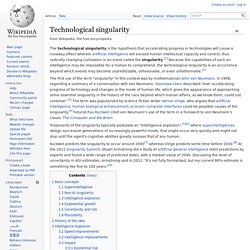
Proponents of the singularity typically postulate an "intelligence explosion",[5][6] where superintelligences design successive generations of increasingly powerful minds, that might occur very quickly and might not stop until the agent's cognitive abilities greatly surpass that of any human. Basic concepts. Singularitarianism. Singularitarianism is a technocentric ideology and social movement defined by the belief that a technological singularity—the creation of superintelligence—will likely happen in the medium future, and that deliberate action ought to be taken to ensure that the Singularity benefits humans.

Singularitarians are distinguished from other futurists who speculate on a technological singularity by their belief that the Singularity is not only possible, but desirable if guided prudently. Accordingly, they might sometimes dedicate their lives to acting in ways they believe will contribute to its rapid yet safe realization.[1] Technological utopianism. In the late 20th and early 21st centuries, several ideologies and movements, such as the cyberdelic counterculture, the Californian Ideology, transhumanism,[1] and singularitarianism, have emerged promoting a form of techno-utopia as a reachable goal.
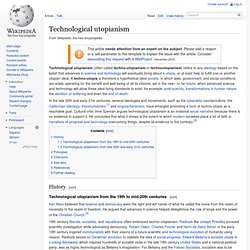
Cultural critic Imre Szeman argues technological utopianism is an irrational social narrative because there is no evidence to support it. He concludes that what it shows is the extent to which modern societies place a lot of faith in narratives of progress and technology overcoming things, despite all evidence to the contrary.[2] History[edit] Technological utopianism from the 19th to mid-20th centuries[edit] Karl Marx believed that science and democracy were the right and left hands of what he called the move from the realm of necessity to the realm of freedom.
Some technological utopians promoted eugenics. H.G. The horrors of the 20th century - communist and fascist dictatorships, world wars - caused many to abandon optimism. Nanosocialism. Politics[edit] Nanosocialism is a stance that favors participatory politics to guide state intervention in the effort to manage the transition to a society revolutionized by molecular nanotechnology.[1][2] In popular culture[edit] In the role-playing game Transhuman Space, nanosocialism is described as a descendant of infosocialism, in which intellectual property is nationalized and distributed by the state.
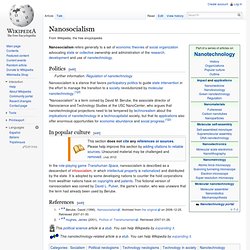
It is adopted by some developing nations to counter the hold corporations from wealthier nations have on copyrights and patents. This fictional version of nanosocialism was coined by David L. Singularity: Artificial Intelligence Will Kill Our Grandchildren. DRAFT 9 Dr Anthony Berglas January 2012 Anthony@Berglas.org (Copy at will but provide attribution) Abstract There have been many exaggerated claims as to the power of Artificial Intelligence (AI), but there has also been real progress.
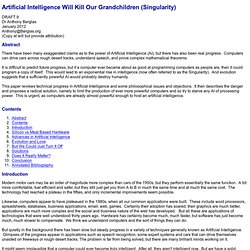
Computers can drive cars across rough desert tracks, understand speech, and prove complex mathematical theorems. It is difficult to predict future progress, but if a computer ever became about as good at programming computers as people are, then it could program a copy of itself. This would lead to an exponential rise in intelligence (now often referred to as the Singularity). This paper reviews technical progress in Artificial Intelligence and some philosophical issues and objections. Contents Introduction Modern motor cars may be an order of magnitude more complex than cars of the 1950s, but they perform essentially the same function. Likewise, computers appear to have plateaued in the 1980s, when all our common applications were built. Unimation PUMA Robot. Orion's Arm. Orion's Arm, (also called the Orion's Arm Universe Project, OAUP, or simply OA) is a multi-authored online science fiction world-building project, first established in 2000[1] by M.

Alan Kazlev, Donna Malcolm Hirsekorn, Bernd Helfert and Anders Sandberg and further co-authored by many people since.[2] It was described by Cory Doctorow as "a pretty thoroughgoing post-Singularity thinggum with lots of opportunity for fun noodling".[3] Anyone can contribute articles, stories, artwork, or music to the website. A large mailing list exists,[4] in which members debate aspects of the world they are creating, discussing additions, modifications, issues arising, and work to be done. Wiki: SL4Wiki.